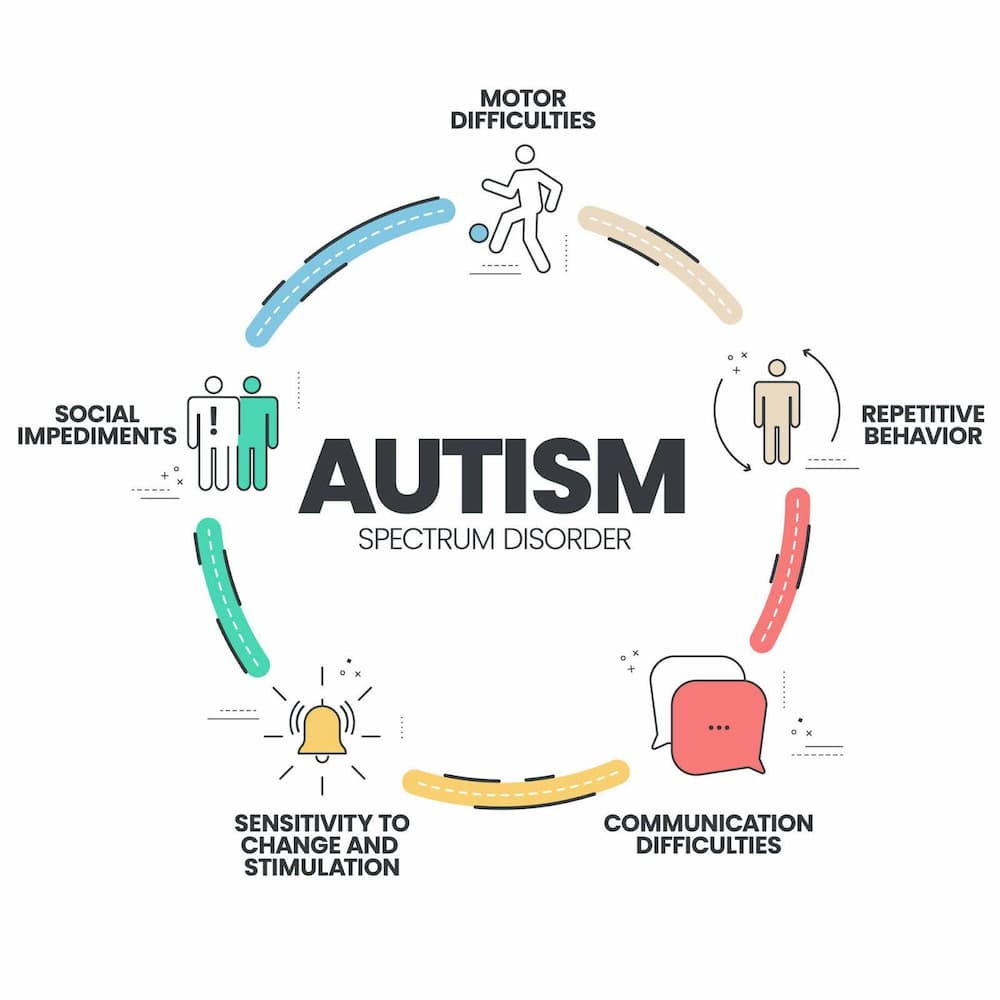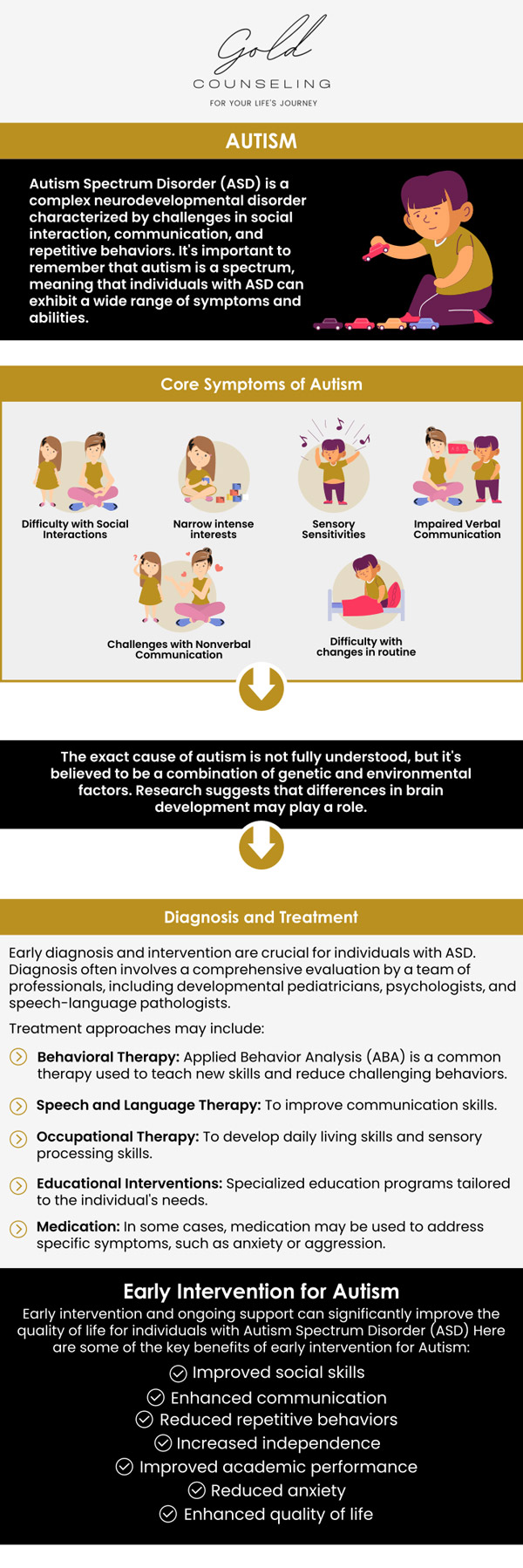Everyday adjustments that Autism Spectrum Therapies professionals use successfully
Everyday adjustments that Autism Spectrum Therapies professionals use successfully
Blog Article
Recognizing the Influence of Behavioral Autism on Life and Social Communications
You could not realize exactly how deeply behavior autism influences life and social interactions. Individuals on the range commonly browse a globe loaded with communication hurdles and sensory overload. These challenges can cause frustration and seclusion, influencing their relationships and total health. Recognizing these nuances is essential for cultivating supportive settings. What approaches can we apply to create more inclusive areas and significant connections? The answers may surprise you.
Specifying Behavior Autism and Its Qualities
Behavioral autism, commonly referred to as autism spectrum condition (ASD), incorporates a range of conditions characterized by obstacles in social communication, interaction, and recurring habits. You may notice that people with ASD often struggle to translate social hints, which can cause misconceptions in discussions. They may locate it hard to establish eye contact or participate in small talk, making social situations really feel frustrating.
Communication difficulties can manifest in various ways, from postponed speech advancement to a choice for utilizing less words. By recognizing these qualities, you can cultivate an environment that promotes approval and encourages effective interaction, helping people with autism grow in their daily interactions.
The Spectrum of Autism: Recognizing Irregularity in Actions
Autism spectrum disorder (ASD) isn't a one-size-fits-all medical diagnosis; it differs commonly among individuals. You may discover that some people with ASD display light signs and symptoms, while others may deal with extra substantial challenges. This irregularity can manifest in behaviors, interests, and sensory sensitivities. You may encounter people who are very spoken and engage quickly in conversations, while others might prefer solitary tasks or communicate non-verbally.
Additionally, the way people with ASD reply to sensory input can differ considerably; some could be overwhelmed by loud noises or intense lights, whereas others prosper in stimulating settings. The spectrum also consists of differences in social interactions; some individuals may have a hard time to translate social hints, while others navigate social setups with family member simplicity. Understanding this irregularity is crucial, as it helps you appreciate everyone's distinct experience and dressmaker assistance to their details needs, fostering a more inclusive environment for every person.
Communication Challenges Encountered by Individuals With Autism
When you connect with individuals on the autism range, you may see their distinct interaction difficulties. They typically encounter difficulties with both nonverbal and verbal cues, which can influence their social communications. Understanding these obstacles is vital for cultivating better connections and support.

Verbal Communication Troubles
Lots of people on the autism spectrum experience spoken communication problems that can significantly affect their day-to-day communications. You may discover it testing to share your thoughts, feelings, or requires plainly. This can bring about stress for both you and those around you, as misunderstandings occur. You may deal with starting discussions, keeping a subject, or understanding subtleties in speech. Often, you might prefer using simple language or recurring expressions, which can limit your capability to take part in much deeper discussions. Your volume, tone, or pace might not line up with social assumptions, triggering others to misinterpret your purposes. Recognizing these challenges can help you and your support network establish techniques to enhance communication and cultivate far better links with others in your life.
Nonverbal Interaction Obstacles
Verbal interaction isn't the only obstacle individuals on the autism spectrum face; nonverbal interaction barriers can be just as substantial. You may find it difficult to analyze body language, faces, and eye contact, which are vital for effective interaction. These challenges can lead to misconceptions or false impressions of social hints, making communications feel complex or overwhelming. You may battle to reveal your very own feelings with nonverbal methods, leaving others unsure of your sensations or intents. This separate can produce sensations of seclusion and irritation. Acknowledging these obstacles is important for fostering understanding and empathy in your interactions. By dealing with nonverbal interaction, you can find strategies to enhance your social experiences and boost your general quality of life.
Social Interaction Effects
Social communications can often really feel frustrating due to the one-of-a-kind communication obstacles faced by people with autism. Acknowledging these difficulties can help you locate approaches to enhance communication, such as exercising social skills in secure settings or making use of visual help. Comprehending your needs permits you to browse social interactions with higher self-confidence and ease.
Social Communication and Connection Building in Autism
While building partnerships can be challenging for people with autism, understanding their one-of-a-kind point of views and interaction styles can promote meaningful links. You could discover that lots of people on the spectrum like direct interaction and might have problem with social signs or little talk. By being straightforward in your interactions, you can aid produce a setting where they really feel comfy.
Make the effort to observe and listen just how they express themselves. This insight can direct you in steering discussions a lot more company website successfully. Participating in shared interests can also offer as a bridge to much deeper connections. Whether it's a leisure activity, a favorite program, or a common enthusiasm, these common strings can open doors to relationship.
Life Regimen: Navigating Techniques and obstacles
Maneuvering life regimens can be especially challenging for individuals with autism, particularly when unanticipated modifications occur. You might locate convenience in having an organized schedule, as it assists you anticipate what's following. When disturbances occur, it's typical to feel overloaded or nervous. To browse these challenges, consider carrying out visual schedules or checklists. These devices can supply quality and confidence.
Establishing a regimen that consists of sensory breaks can also be advantageous. You can intend time-outs throughout your day to reenergize. It's important to interact with those around you, allowing them recognize your requirements and preferences. This helps develop an understanding setting.
Finally, technique mindfulness strategies to manage stress and anxiousness. Easy breathing workouts or grounding methods can make a considerable distinction. By integrating these techniques, you can enhance your everyday regimen and reduce disruptions, making life feel much more workable.
Toughness and Abilities of Individuals on the Autism Range
Recognizing daily life regimens is just one element of the autism experience. Several people on the autism range possess remarkable strengths and abilities that establish them apart.
Furthermore, your memory abilities often beam, particularly in areas of interest. Autism Spectrum Therapies. This propensity for keeping info can make you a beneficial source in areas like art, scientific research, or modern technology. You may additionally display strong visual thinking, allowing you to imagine complicated principles and solve troubles artistically
Furthermore, your unique perspective on the globe can promote compassion and understanding in others, enriching social communications. Accepting these staminas not just boosts your confidence but also assists others appreciate the varied skills you offer the table.
Producing Inclusive Atmospheres for People With Autism
Developing comprehensive environments for people with autism starts with designing sensory-friendly spaces that cater to their special requirements. You can likewise foster chances for social communication, aiding to construct links and friendships. By making these modifications, you'll add to a much more welcoming ambience for every person.
Creating Sensory-Friendly Spaces
While making sensory-friendly spaces, it's vital to show on the distinct requirements of people with autism. Integrate peaceful areas where individuals can reenergize and pull away when bewildered. Consist of aesthetic timetables or clear signage to help people browse the space with confidence.
Promoting Social Interaction Opportunities
Designing sensory-friendly rooms not just addresses private convenience however likewise sets the stage for significant social communications among people with autism. To advertise these interactions, produce inclusive atmospheres that invite involvement. Organize organized tasks, like art courses or team games, that urge partnership without overwhelming sensory input. Use aesthetic help and clear interaction to aid every person engage easily. Motivate peer mentoring, combining individuals with autism with helpful peers who can direct them via social situations. In addition, take into consideration holding regular neighborhood events that commemorate neurodiversity, a knockout post promoting acceptance and understanding among all participants. By implementing these techniques, you can enhance social possibilities, assisting people with autism build friendships and reinforce their social abilities in a risk-free, inviting setting.

Frequently Asked Inquiries
Exactly How Can Buddies Assistance A Person With Behavioral Autism?
You can support a friend with behavioral autism by being individual, paying attention proactively, and valuing their boundaries. Participate in activities they take pleasure in, interact honestly, and develop a comfy setting where they really feel valued and understood.
What Resources Are Available for Parents of Kid With Autism?
You can discover numerous resources for parents of children with autism, including assistance teams, instructional internet sites, and neighborhood social work. Connecting with various other parents can additionally provide important understandings and shared experiences to aid browse difficulties.
Can Behavioral Autism Change Over Time?

Yes, behavioral autism can transform gradually. You might observe shifts in interaction, social abilities, and habits as your youngster grows. Early treatment and support usually play crucial roles in these developing changes.
Just How Do Sensory Sensitivities Affect Every Day Life?
Sensory level of sensitivities can make everyday experiences overwhelming. You may fight with loud noises or intense lights, bring about anxiety or evasion. Finding environments that suit your needs can significantly enhance your convenience and overall life.
What Prevail Misconceptions Concerning Behavioral Autism?
You could believe behavior autism just impacts communication skills, however it's even more facility. Many assume individuals do not have compassion or intelligence, which isn't true. Comprehending these false impressions assists foster acceptance and support for those on the spectrum.
Behavior autism, usually referred to as autism range problem (ASD), includes an array of conditions identified by difficulties in social communication, communication, and recurring behaviors.Social communications can frequently really feel frustrating due to the distinct communication difficulties faced by individuals with autism.Creating sensory-friendly areas not only addresses private convenience but likewise establishes the stage for meaningful social communications amongst people with autism. Urge peer mentoring, coupling people with find here autism with helpful peers that can guide them via social scenarios. By implementing these methods, you can boost social possibilities, helping people with autism develop friendships and strengthen their social abilities in a safe, welcoming setting.
Report this page